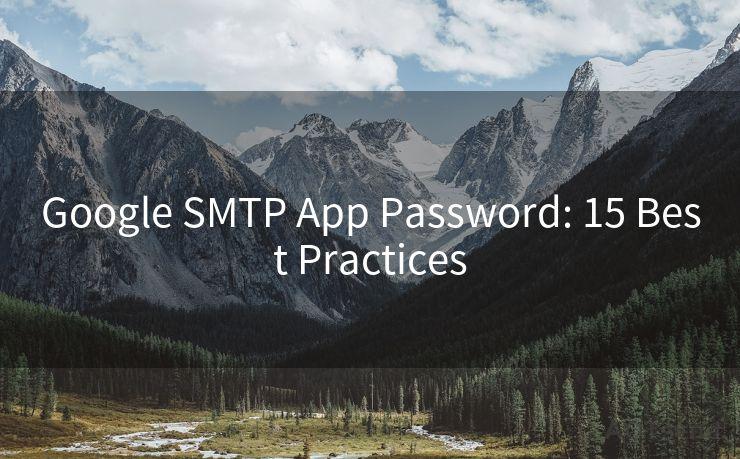Google SMTP App Password: 15 Best Practices




When it comes to managing your Google account and using it for email communication, security should always be a top priority. One way to enhance security, especially when using third-party email clients, is by utilizing SMTP (Simple Mail Transfer Protocol) with an App Password. Here are the 15 best practices for using a Google SMTP App Password.
1. Understanding App Passwords
Before we dive into the best practices, it's essential to understand what an App Password is. An App Password is a unique, one-time password that you can use to sign in to your Google Account from a non-Google application. This ensures that even if your primary password is compromised, attackers cannot access your account from unsupported apps.
2. Enabling Two-Factor Authentication
To use App Passwords, you must first enable two-factor authentication (2FA) on your Google Account. 2FA adds an extra layer of security by requiring two verification methods: your password and a second factor, like a code sent to your phone.
3. Creating an App Password
Once 2FA is enabled, you can create an App Password specifically for the application or device you want to authorize. Make sure to follow the prompts carefully and label your App Passwords for easy identification later.
🔔🔔🔔
【AOTsend Email API】:AOTsend is a Managed Email Service for sending transactional emails. Support Email Types: reminders, authentication, confirmations, notifications, verification codes, invoices, password resets, account activations, billing statements, two-factor authentication (2FA), and one-time passwords (OTP) emails, etc. $0.28 per 1000 Emails. 99% Delivery, 98% Inbox Rate.
You might be interested in:
Why did we start the AOTsend project, Brand Story?
What is a Managed Email API, How it Works?
Best 25+ Email Marketing Platforms (Authority,Keywords&Traffic Comparison)
Best 24+ Email Marketing Service (Price, Pros&Cons Comparison)
Email APIs vs SMTP: How they Works, Any Difference?
4. Keeping App Passwords Secure
Treat your App Passwords like any other sensitive information. Do not share them with anyone, and store them securely, preferably in a password manager.
5. Using Unique Passwords for Each Application
Create a unique App Password for each application or device you authorize. This ensures that if one password is compromised, the others remain secure.
6. Regularly Updating App Passwords
Periodically update your App Passwords, especially if you suspect they may have been compromised or if you've changed your primary Google Account password.
7. Monitoring Account Activity
Regularly check your Google Account activity to ensure no unauthorized access attempts have been made using your App Passwords.
8. Avoiding Phishing Scams
Be aware of phishing scams that may try to trick you into revealing your App Passwords. Never share your passwords with anyone, especially via email or unsolicited phone calls.
9. Configuring Secure SMTP Settings
When setting up your email client to use the SMTP server, ensure you're using secure connection settings (SSL/TLS) to encrypt your email transmissions.
10. Testing Your SMTP Configuration
After setting up your SMTP with an App Password, send a test email to ensure everything is working correctly. This helps identify any potential issues early on.
11. Troubleshooting Connection Issues
If you encounter connection issues, double-check your SMTP settings, including the server address, port number, and encryption method. Also, confirm that your App Password is entered correctly.
12. Limiting Access to Authorized Applications
Only authorize applications and devices that you trust. Avoid authorizing unknown or suspicious third-party apps.
13. Staying Updated on Security News
Keep yourself informed about the latest security threats and updates from Google. This helps you stay vigilant and proactive in protecting your account.
14. Contacting Google Support
If you encounter any problems or have security concerns, don't hesitate to contact Google Support for assistance.
15. Balancing Security and Convenience
While App Passwords enhance security, they can also add an extra step to your email setup process. Strike a balance between ensuring account security and maintaining convenience in your daily workflow.
By following these best practices, you can effectively use Google SMTP App Passwords to secure your email communications and protect your Google Account from unauthorized access. Remember, security is an ongoing process, and staying vigilant is key to maintaining a safe online presence.





Scan the QR code to access on your mobile device.
Copyright notice: This article is published by AotSend. Reproduction requires attribution.
Article Link:https://www.mailwot.com/p1312.html



